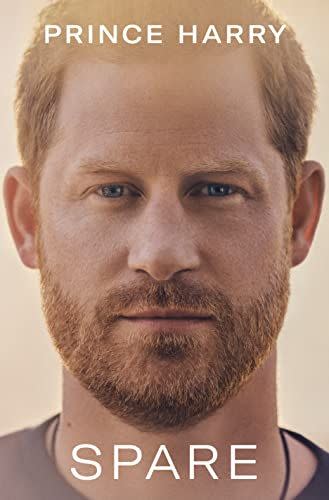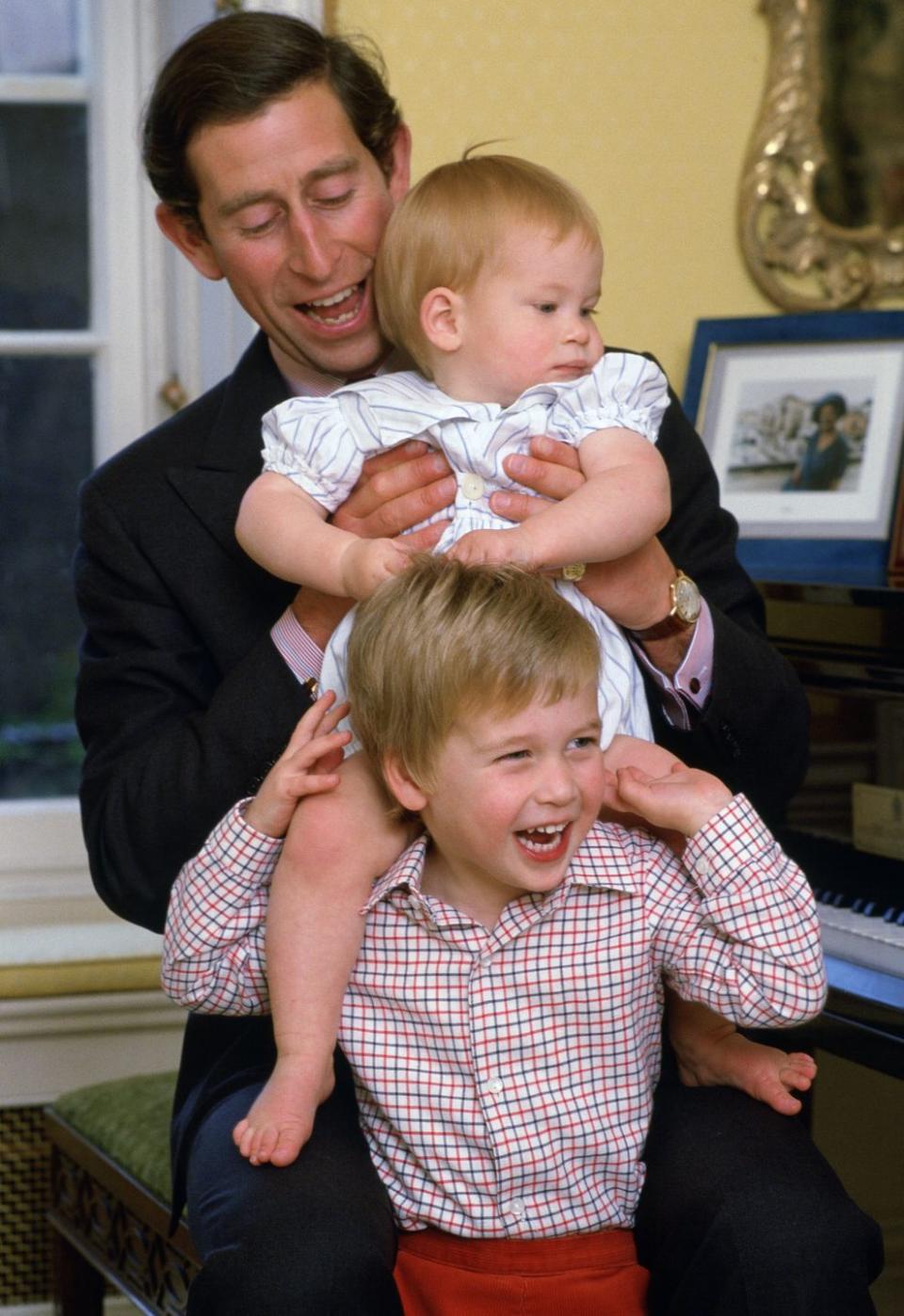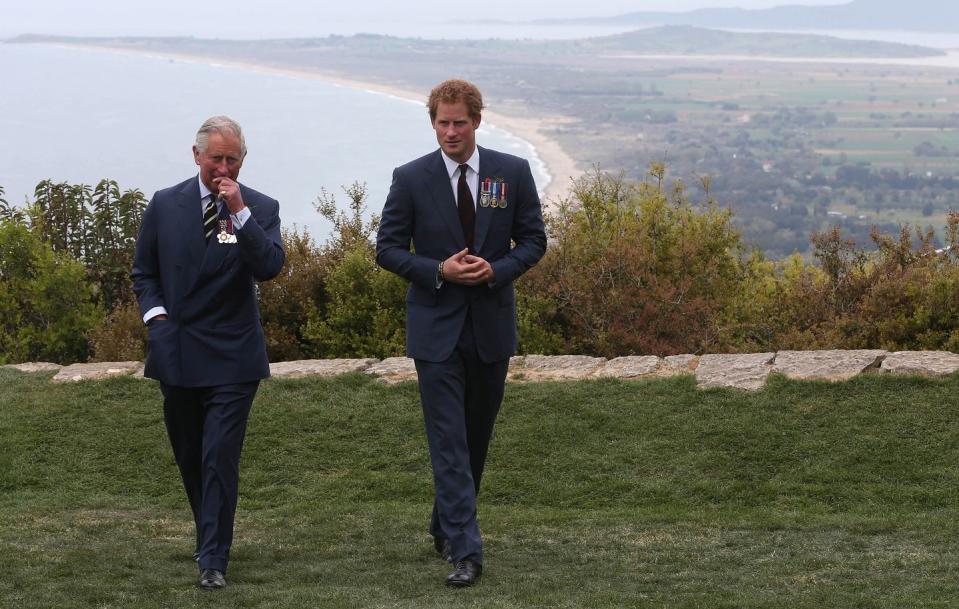In Spare, Prince Harry Paints a Full Portrait of King Charles as a Father
"Hearst Magazines and Yahoo may earn commission or revenue on some items through the links below."
In Spare, Prince Harry doesn't hold back. He opens up about his grief, his active duty tours in Afghanistan, falling in love with Meghan Markle, his vitriolic hatred for the press, and the rift with Prince William. There's one person in the Spare narrative, however, who surprisingly stands out: Harry's father, King Charles.
While there are many personal details revealed about the King that he probably doesn't want out there—his love for his teddy bear, how he performs daily headstands in his boxers to deal with his back pain, how he compares himself to Prince Hal in Shakespeare's Henry V—the book reveals a complex portrait of Charles as a father. (Or "Pa," as Harry calls him; Charles, Harry writes, calls his son "darling boy.")

Spare
amazon.com
$22.42
amazon.comHarry's memoir begins with Princess Diana's death, and how when Charles broke the tragic news, he didn't hug his son.
"He wasn’t great at showing emotions under normal circumstances, how could he be expected to show them in such a crisis?" Harry writes. "But his hand did fall once more on my knee and he said: It’s going to be OK. That was quite a lot for him. Fatherly, hopeful, kind. And so very untrue."
From there, Prince Harry shares how Charles dealt with suddenly being a single parent. "He’d always given an air of being not quite ready for parenthood—the responsibilities, the patience, the time. Even he, though a proud man, would’ve admitted as much. But single parenthood? Pa was never made for that," Harry writes. "To be fair, he tried. Evenings, I’d shout downstairs: Going to bed, Pa! He’d always shout back cheerfully: I’ll be there shortly, darling boy! True to his word, minutes later he’d be sitting on the edge of my bed. He never forgot that I didn’t like the dark, so he’d gently tickle my face until I fell asleep. I have the fondest memories of his hands on my cheeks, my forehead, then waking to find him gone, magically, the door always considerately left open a crack."
The image of Charles sitting with Harry until he fell asleep—that's a father who is trying his best. In another anecdote, Harry recalls how Charles taught him to drive as a kid by holding his son on his lap. In yet another, when Harry is figuring out what to do following school, Charles is nothing but supportive of him not attending university, and wants him to "see the world, darling boy! Have adventures."
After Harry makes the headlines for wearing a Nazi costume, and is photographed nude in Vegas, Charles's reaction is gentle and kind. Following the costume incident, Charles "didn’t gloss over the facts," Harry writes. "Darling boy, how could you be so foolish? My cheeks burned. I know, I know. But he quickly went on to say that it was the foolishness of youth, that he remembered being publicly vilified for youthful sins, and it wasn’t fair, because youth is the time when you’re, by definition, unfinished. You’re still growing, still becoming, still learning, he said. He didn’t specifically cite any of his youthful humiliations, but I knew. His most intimate conversations had been leaked, his most ill-conceived remarks had been trumpeted. Past girlfriends had been interrogated, their rating of his lovemaking spread across tabloids, even books. He knew all about humiliation. He promised that the fury about this would blow over, the shame would fade. I loved him for that promise, even though—or maybe because—I knew it to be false. The shame would never fade. Nor should it." Charles then sent his son to meet with Britain's Chief Rabbi.
Harry clearly has deep sympathy and love for Charles, and is well aware of his father's own struggles with displaying emotion (as well as Charles's clear lack of therapy or mental health support). In one instance, Harry writes of Charles's tough childhood, and ponders how that impacted him. Of the aforementioned teddy bear, Harry says, "Teddy went everywhere with Pa. It was a pitiful object, with broken arms and dangly threads, holes patched up here and there. It looked, I imagined, like Pa might have after the bullies had finished with him. Teddy expressed eloquently, better than Pa ever could, the essential loneliness of his childhood."
Spare contains stories about Charles as a father that have rarely made headlines. Instead, the tales of Harry and William's early childhood tend to focus, perhaps rightly so, on Diana. Yet in this royal memoir, we see Charles through Harry's eyes.

Harry writes, "He’d chased us all over Sandringham, making up wonderful games, like the one where he wrapped us in blankets, like hot dogs, until we screamed with helpless laughter, and then yanked the blanket and shot us out of the other end. I don’t know if Willy or I have ever laughed harder. But, long before we were ready, he stopped engaging in that kind of physical fun."
Harry also reveals Charles's eccentricities, particularly in describing his daily routine. He remembers having dinner the day before they found out Diana was dead, recalling, "As we all stuffed our faces we heard Pa padding past in his slippers, coming from his bath. He was carrying his 'wireless,' which is what he called his portable CD player, on which he liked to listen to his 'storybooks' while soaking. Pa was like clockwork, so when we heard him in the hall we knew it was close to eight." You can hear Harry's affection for his father in this little anecdote. There's no malice, no anger: Only a son recounting how his dad's quirks.
In another part of Spare, Harry writes, "He was always sniffing things. Food, roses, our hair. He must’ve been a bloodhound in another life." It's a tender, albeit strange, image of Charles: the future king, who loves to smell his sons.
The depiction is not always loving, though. When Harry is serving in Afghanistan, he writes of talking to his girlfriend at the time, Chelsea Davy, or "Chels." Harry says, "To think of home was never easy, for a complex set of reasons. To hear home was a stab in the chest. If I didn’t call Chels, I called Pa. How are you, darling boy?"
Harry adds, "But he asked me to write rather than call. He loved my letters. He said he’d much prefer a letter."
Doesn't that just break your heart, a little bit?
Elsewhere, Harry writes of Charles's inability to talk about his emotions. Harry says, "He had trouble communicating, trouble listening, trouble being intimate face-to-face. On occasion, after a long multi-course dinner, I’d walk upstairs and find a letter on my pillow. The letter would say how proud he was of me for something I’d done or accomplished. I’d smile, place it under my pillow, but also wonder why he hadn’t said this moments ago, while seated directly across from me."

Later in Spare, Harry details confiding in his father over his ongoing mental health struggles. "Pa, I’m really struggling with panic attacks and anxiety," he told Charles, who tries to help, and sends him to a doctor, who "wanted to give me pills," Harry recalls. "I didn't want to take pills."
Over dinner one night at Highgrove, the father and son talk about Harry's anxiety. As Harry writes, "Pa and I spoke at some length about what I’d been suffering. I gave him the particulars, told him story after story. Towards the end of the meal he looked down at his plate and said softly: I suppose it’s my fault. I should’ve got you the help you needed years ago. I assured him that it wasn't his fault. But I appreciated the apology."
One can read this as an indictment of Charles not getting his sons the therapy they needed after Princess Diana's death, or one can see it as a son recognizing Charles's growth after failing. Everyone makes mistakes.
The pain Harry feels surrounding his father not understanding his animosity towards the press is particularly acute in the book. Charles, Harry writes, doesn't understand what was so bothersome about the tabloid treatment of Meghan Markle. After one discussion about the press, Harry writes, "The conversation went in circles and when we hung up I felt—abandoned."
He's cynical, at times, in his portrayal of Charles, and Charles's relationship with the press. Harry does psychoanalyze that relationship, writing of his father, "There was always a but with him when it came to the press, because he hated their hate, but oh how he loved their love. One could make the argument that therein lay the seeds of the whole problem, indeed all problems, going back decades. Deprived of love as a boy, bullied by schoolmates, he was dangerously, compulsively drawn to the elixir they offered him."

This article could stretch thousands of more words of what Harry writes about Charles—his love of gardening, his positive bond with Meghan (at the start), his desire for a slimmed-down monarchy, what Harry calls Charles's "pathetic" response to leaks about Prince William—but ultimately, it's clear why Harry believes, as he told Anderson Cooper, "None of anything that I’ve written, anything I’ve included is ever intended to hurt my family."
King Charles may never read Spare. He's not currently talking to Harry, as Harry revealed on 60 Minutes. Buckingham Palace has yet to respond publicly to anything Harry has said in interviews or written in the memoir. But if anything—despite everything!—Prince Harry's portrait of his father is three-dimensional.
You Might Also Like


